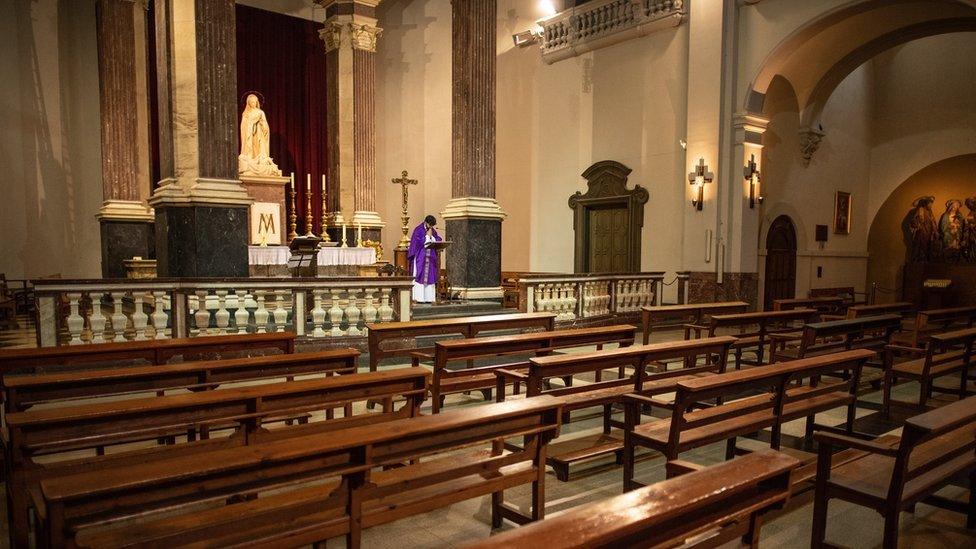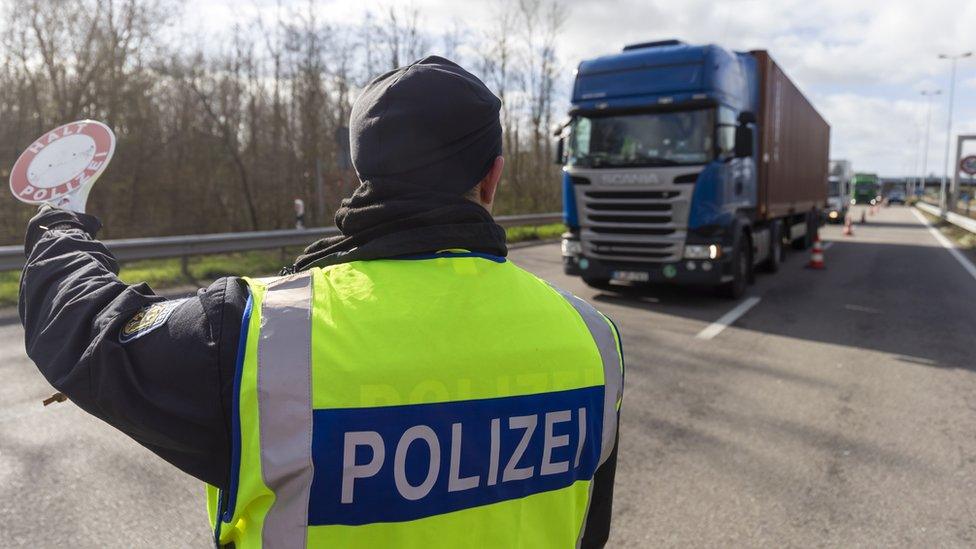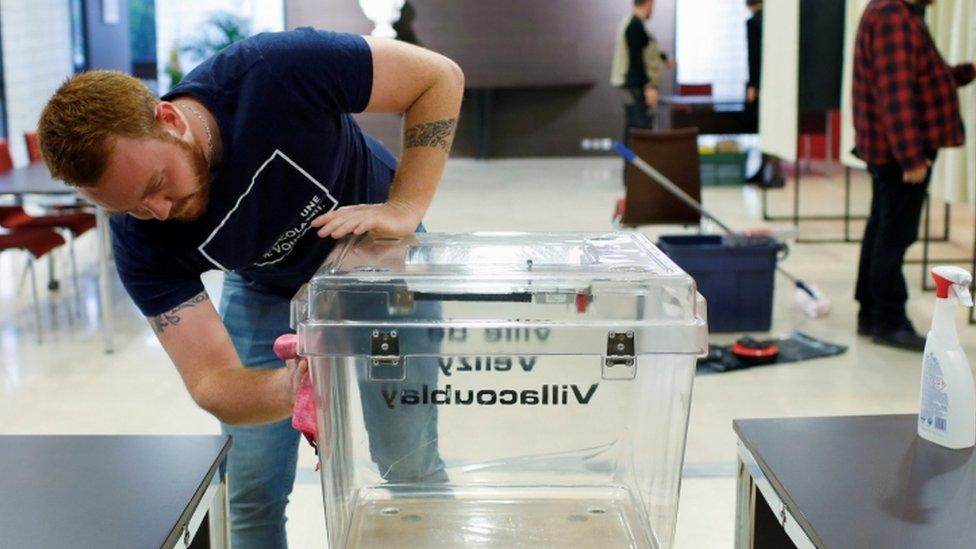Coronavirus: Germany to impose border controls over coronavirus
- Published
Police use drones to enforce movement restrictions in Spain's fight against the coronavirus infection
Germany will impose temporary controls on its borders with France, Switzerland, Austria, Denmark and Luxembourg on Monday to stop coronavirus spreading.
Other EU states are also taking radical action, with Austria banning gatherings of more than five people from Monday.
The Republic of Ireland is asking all pubs to shut until 29 March and schools in the Netherlands are to close.
The moves follow strict measures taken by France and Spain on Saturday.

This priest in Barcelona said Mass from his empty church via YouTube
In Italy, the number of deaths in a 24-hour period reached a new high, up by 368 since Saturday to reach a total of 1,809. Of those, 1,218 were recorded in the Lombardy region, which is home to the business hub of Milan.
Spain recorded 97 more deaths and 2,000 new cases in the past 24 hours, bringing the country's total death toll to 288, external and overall number of cases to 7,753.
France, with 4,469 confirmed cases and 91 deaths, is holding local elections, despite the shutting of cafes, restaurants and most shops.
In Switzerland, the number of infections have leapt by 800 to reach 2,200 in just 24 hours.
The World Health Organization (WHO) said on Friday that Europe was now the "epicentre" of the pandemic.
WHO head Dr Tedros Adhanom Ghebreyesus has urged countries to use aggressive measures, community mobilisation and social distancing to save lives.


LIVE UPDATES: Follow the latest developments
EASY STEPS: How to keep safe
A SIMPLE GUIDE: What are the symptoms?
GETTING READY: How prepared is the UK?
TRAVEL PLANS: What are your rights?

How will the German border shutdown work?
The borders will close at 08:00 (07:00 GMT) on Monday, German Interior Minister Horst Seehofer told reporters
However, goods will continue to flow between the countries and commuters may still cross the borders, government sources said earlier.
The aim is to contain coronavirus but also reportedly to curb panic-buying by foreigners which has led to some supply problems in the border regions.
Germany has seen at least nine deaths with coronavirus and 4,585 cases of infection.

Some border traffic will continue
Germany, which is part of the borderless Schengen area, has nonetheless faced mounting pressure to close its frontiers.
Three of Germany's neighbours - Poland, the Czech Republic and Denmark - have already closed their borders or introduced severe restrictions.
Meanwhile, Portugal imposed controls on its border with Spain to begin on Monday.

Anxious whispers in the sunshine
By Imogen Foulkes, BBC News, Bern
For everyone here, life has changed. Parents are desperately looking for childcare following Friday's announcement that schools will close from Monday. Thousands of families who booked Easter holidays abroad must cancel: there are few countries the Swiss can travel to at the moment.
But on this sunny weekend, people are out and about. Restaurants are limited to 50 people but business is quite brisk. Tables are 2m (6ft) apart and disinfected regularly.
One elderly lady, carefully washing her hands after enjoying a hot chocolate, says she knows it's important to follow the rules. But, she adds, "I won't stop social contact." And yet that is exactly what the government wants her to do.
Meanwhile a waitress whispers that she doesn't think the restaurant will stay open much longer. She's worried for her job. In canton Ticino, and in Basel, the restaurants are already closed.

What is happening in other EU states?
Austrian Chancellor Sebastian Kurz urged people to self-isolate and banned gatherings of more than five people as of Monday.
He added the UK, the Netherlands, Russia and Ukraine to a list of countries, entry to whose citizens is restricted. Schools and most shops will be closed from Monday, following an earlier announcement.
Everything you need to know about the coronavirus – explained in one minute by the BBC's Laura Foster
In the Netherlands, bars, sports clubs, sex shops and coffee shops will be shut from Sunday night.
In other developments:
Slovakia declared a state of emergency
A man of 75 became the first person to die with coronavirus in Hungary
Nobody will be allowed to enter the Republic of Cyprus without a medical certificate confirming they do not have coronavirus, and those who do face compulsory 14-day quarantine
The prime minister of the Czech Republic, Andrej Babis, is proposing to place the entire country under quarantine after cases rose from 214 to 231, with no fatalities
Romania, which has 123 cases, is set to declare a state of emergency on Monday
What are Spain and France doing?
On Saturday Spanish Prime Minister Pedro Sánchez said citizens should not leave home, except for buying essential supplies and medicines, or for work.
The state of emergency there will last for two weeks - more if deemed necessary and parliament approves.
In France the closure - which went into force at 23:00 GMT on Saturday - applies to restaurants, cafes, cinemas and nightclubs as well as non-essential businesses.

There has been criticism of the decision to allow elections in France
Prime Minister Édouard Philippe also asked people to reduce their travel, especially between towns, in the country of 63.5 million.
However, crowds of people could be seen out enjoying the sunshine on Sunday in the green spaces of Paris.
Allow X content?
This article contains content provided by X. We ask for your permission before anything is loaded, as they may be using cookies and other technologies. You may want to read X’s cookie policy, external and privacy policy, external before accepting. To view this content choose ‘accept and continue’.


Are you in France, Spain or Austria? Have you been affected by the coronavirus? Share your experiences by emailing haveyoursay@bbc.co.uk, external.
Please include a contact number if you are willing to speak to a BBC journalist. You can also contact us in the following ways:
WhatsApp: +44 7756 165803
Tweet: @BBC_HaveYourSay, external
Please read our terms & conditions and privacy policy